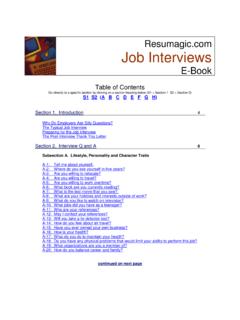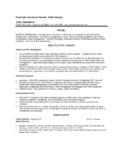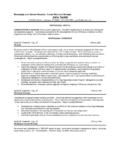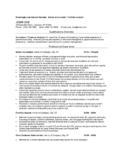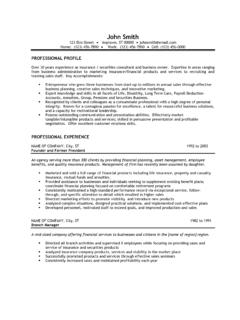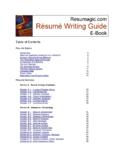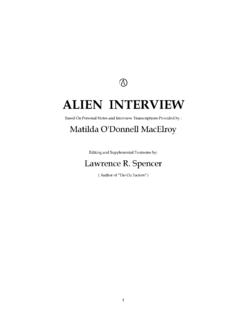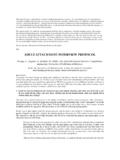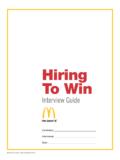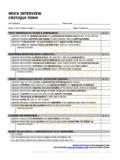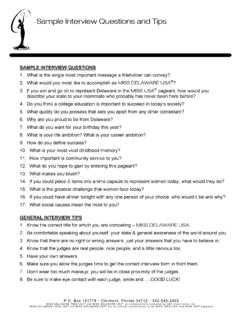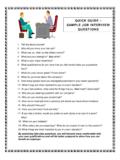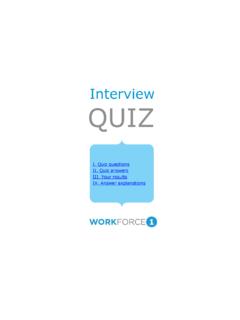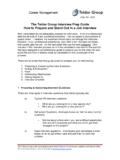Transcription of 40 Job Interview Questions and Answers - …
1 40 Job Interview Questions and Answers Copyright Resumagic [ ] Table of Contents The Typical Job Interview 2 Preparing for the Job Interview 3 Questions to Ask at the Job Interview 3 Illegal Interview Questions 5 The Post- Interview Follow-Up 5 Most Commonly-Asked Interview Questions 6 Job Interview Questions & How You Should Answer Them 7 question 1: Tell me about yourself. question 2: Why should we hire you? question 3: What is your greatest strength (or strengths)? question 4: What is your greatest weakness (or weaknesses)? question 5: Why do you want to leave your present empl yer? oQuestion 6: Why do you want to work for this compa?
2 NyQuestion 7: What do you know about our company? question 8: Why do you want this position? question 9: Do you work better alone or as part of a team? question 10: What did your last supervisor criticize most about your performance? question 11: Where do you see yourself in five years? question 12: Why have you changed jobs so frequently? question 13: Are you willing to relocate? question 14: Are you willing to travel? question 15: Are you willing to work overtime? question 16: Have you ever been fired or asked to resign? question 17: How long have you been searching for a job? OR Why haven't you received a job offer? question 18: What previously held job do you consider to be your favorite and why?
3 question 19: Do you consider yourself to be organized? Do you manage your time well? question 20: Would you choose the same career if you could start over again? question 21: Why have you stayed with the same employer for so long? question 22: Do you consider yourself to be a risk-taker? question 23: Would your present employer be s rprised to know you're job hunting? uQuestion 24: How well do you handle change? question 25: What salary are you expecting? question 26: How do you resolve disputes with co-workers? How do you handle conflicts in the workplace? question 27: Who was your favorite boss and why? Who was your least favorite boss and why? question 28: What could you have done to improve your relationship with your least favorite boss?
4 question 29: What book are you currently reading (or what ws the last book you read)? a What were the last three books that you read? question 30: What is the last movie that you saw? question 31: Are you considering oers from other employers? ffQuestion 32: When can you start? question 33: Why did you decide to attend X College? Are you happ with your choice? yQuestion 34: What factors did you consider in choosing your major? question 35: Have you ever fired anyone? question 36: How do you motivate employees? question 37: What is your commitment to this job? question 38: Aren't you overqualified for this job? question 39: Are you opposed to doing a lot of routine work?
5 question 40: Do you have any Questions ? The Typical Job Interview The purpose of the typical job Interview is to more closely screen a handful of applicants who have made the final cut. If you are called for a job Interview it means that the employer believes you have the basic skills and experience required for the job; however, he wants to see you in person so he can learn more about you, your personality, your appearance, your demeanor and your ability to answer some really stupid Questions without losing your temper. Depending on the employer you could be competing against as little as three or as many as 30 other applicants. So you would do well to prepare for the Interview carefully if you want the job.
6 The average person looking for employment usually gets called for 10 to 15 interviews before he gets an offer. Most job interviews follow a standard format: (1) Greeting and small talk to put you at ease and break the ice. The interviewer may give you a preview of what will occur during the Interview . (2) The employer may give you a brief overview of the position or additional information about the organization. (3) You respond to Questions . If it's a good Interview , this is the longest segment and you should do most of the talking. (4) You ask Questions of the interviewer. Have at least five or ten Questions prepared beforehand. (5) The interviewer closes the Interview and explains the next steps in the process.
7 Be sure to thank the interviewer for his or her time. During the Interview you should: ~Be enthusiastic and prepared ~Be knowledgeable about the organization ~Be confident and sell your skills ~Listen carefully and be interested During the Interview , the interviewer will try to determine if you have the following traits: (1) Achiever (2) Productive (3) Self-starter (4) Contributor (5) Quick Learner (6) Easy Going (7) Dependable (8) Stable (9) Responsible The interviewer will try to determine if you possess the nine traits above by asking you a series of Questions and observing your demeanor while you answer them. Therefore, you should spend some time preparing for the job Interview in order to make the best impression possible.
8 Be able to answer the question : "Why should you be hired?" What skills do you have that are pertinent to the position for which you're interviewing? Identify two or three of your top selling points and determine how you can illustrate them during the Interview . What stories can you tell the interviewer about your use of these particular skills or knowledge? And, of course, you must prepare for the job Interview by preparing Answers to commonly-asked Interview Questions . Page 2 Don't be surprised if you are called back to Interview with the same employer two or three times. With the job market in the dumps, employers can easily pick and choose among many applicants. During these interviews you must come across as very friendly, easy to get along with, enthusiastic about the job, as well as be able to intelligently answer Interview Questions .
9 Preparing for the Job Interview Memorizing good Answers to typical Interview Questions isn't enough preparation. Why? Imagine three people sitting in a lobby waiting to Interview for the same job. One of the applicants has spent several hours researching the company and its industry. The other two have not done any research at all. Who do you think stands the best chance of getting the job? The person who lets the interviewer know he's done his research. Spending three, four or even more hours to prepare for a job Interview is recommended by career experts. You should become familiar with the company, its products or services, its competitors, the industry in which it operates, and decide how your skills will benefit the company so you can answer Interview Questions , such as "Why do you want to work for us?
10 " "What do you know about our company?" "How can you benefit our company?" If you do this, your odds of beating out your competition increase dramatically. Do Research The best way to start researching a company is simply to type "Name of Company" in to the search form at a major search engine, such as or, if it's a big company go right to the website: Once you know more about the company and its industry, you can better match your skills and qualifications to that company's needs. Now you're ready to prepare for those tough job Interview Questions . Other places to do research on companies are as follows: 4llStocks: Business Wire: Brint: Wetfeet: Hoovers: Thomas Register: Topics to Research When researching a company you should know the Answers to the following Questions before you show up for the Interview : How old is the company?
